A marketing budget template is a comprehensive document that outlines a business organisation’s allocations to its marketing-related initiatives and projects.
This template serves as a roadmap for the estimated costs associated with various marketing ventures, including paid advertising, marketing personnel, marketing automation software, and web content. By utilising this template, companies can effectively plan, monitor, and control their marketing expenditures, ensuring optimal use of resources and enabling them to achieve their marketing objectives within the allocated financial constraints.
A budget for marketing activities has a simple layout that is easy to read, with notes for each category that describe the details of what they will be used for.
It is easy to argue that a small enterprise does not need a budget for promotional campaigns as they have limited resources. But that is another reason you need specific fund allocation for such activities. With proper allocation of funds, you can plan and organize upcoming marketing initiatives while keeping expenses to a minimum.
Making a budget for marketing can be difficult. This is because before the budget is made, the plans of the organisation must be clear, as well as the choice of the best channels to execute these plans. Also, there has to be enough data, techniques, and tools to make accurate plans and estimates for the budget.
In this article, we will share a step-by-step guide on how to plan a marketing budget. Finally, as a bonus, we will share templates that will assist you in making a budget.
Free Marketing Budget Templates
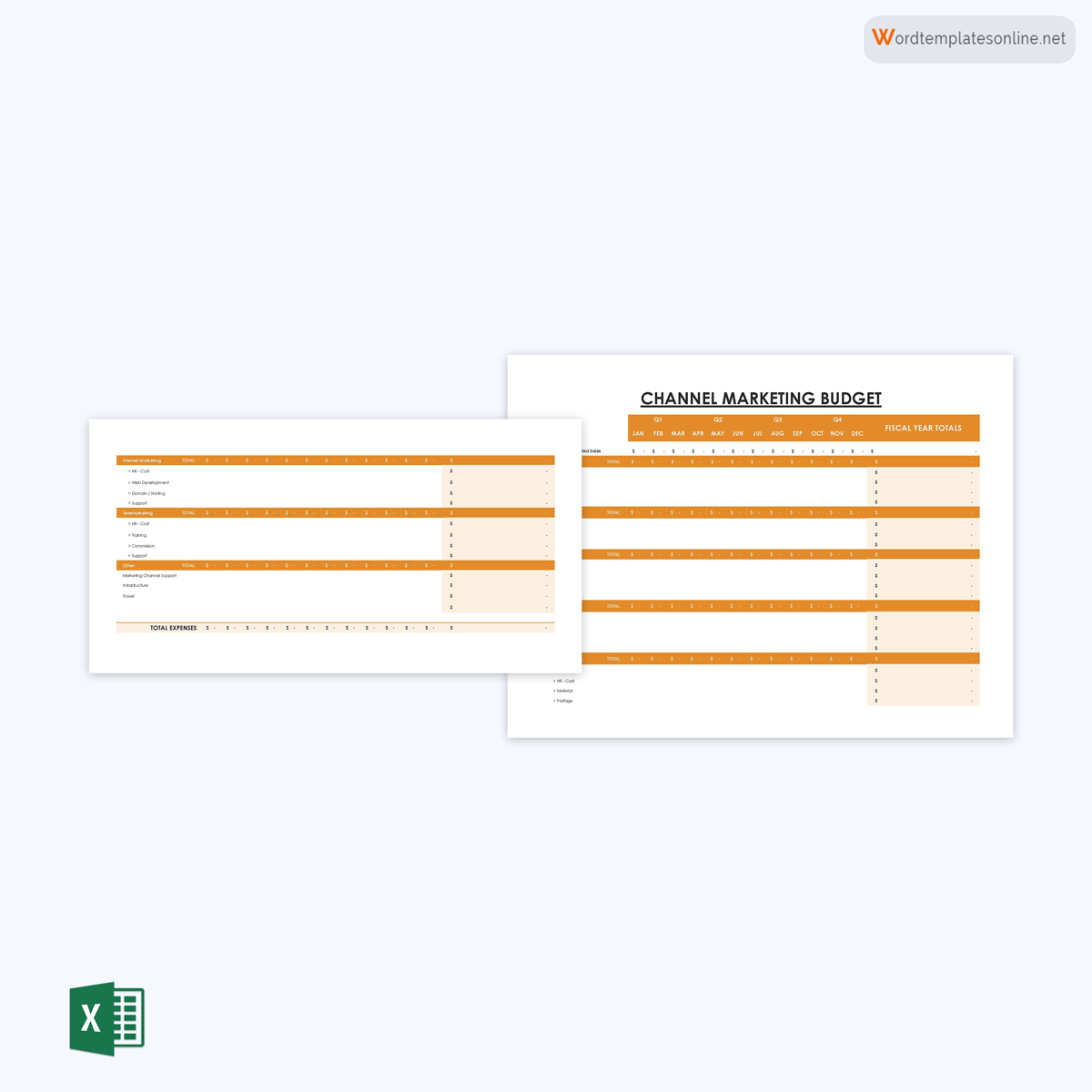
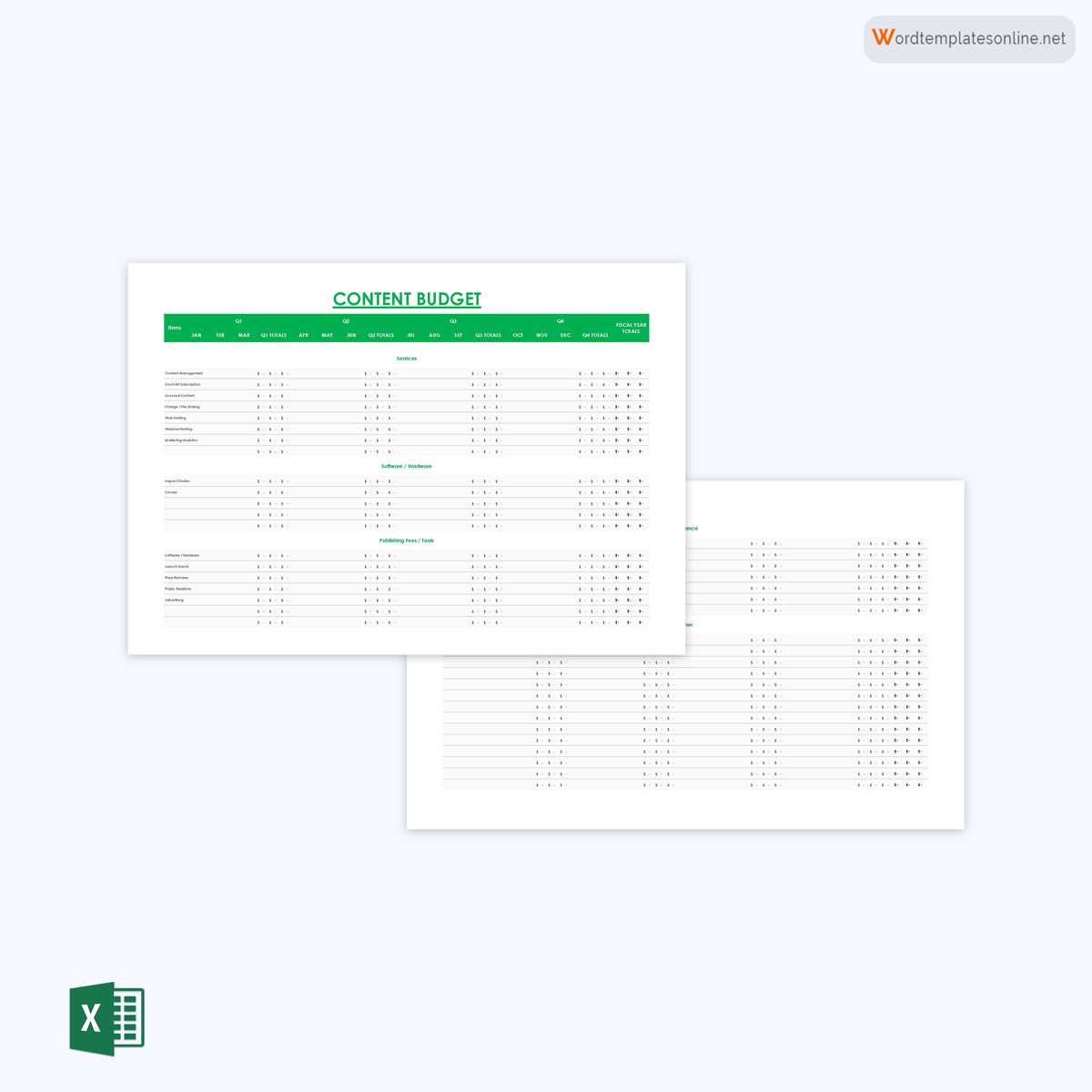
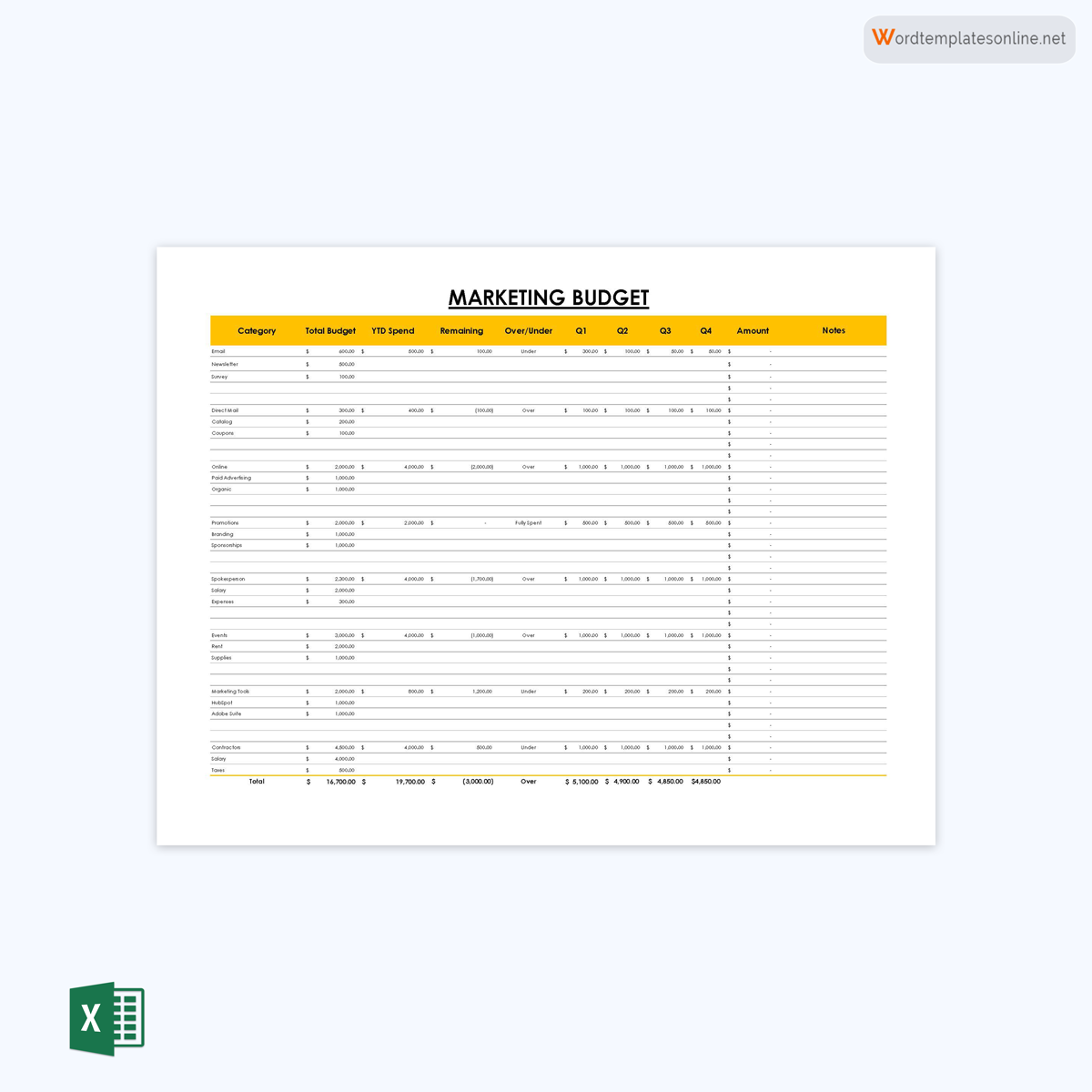
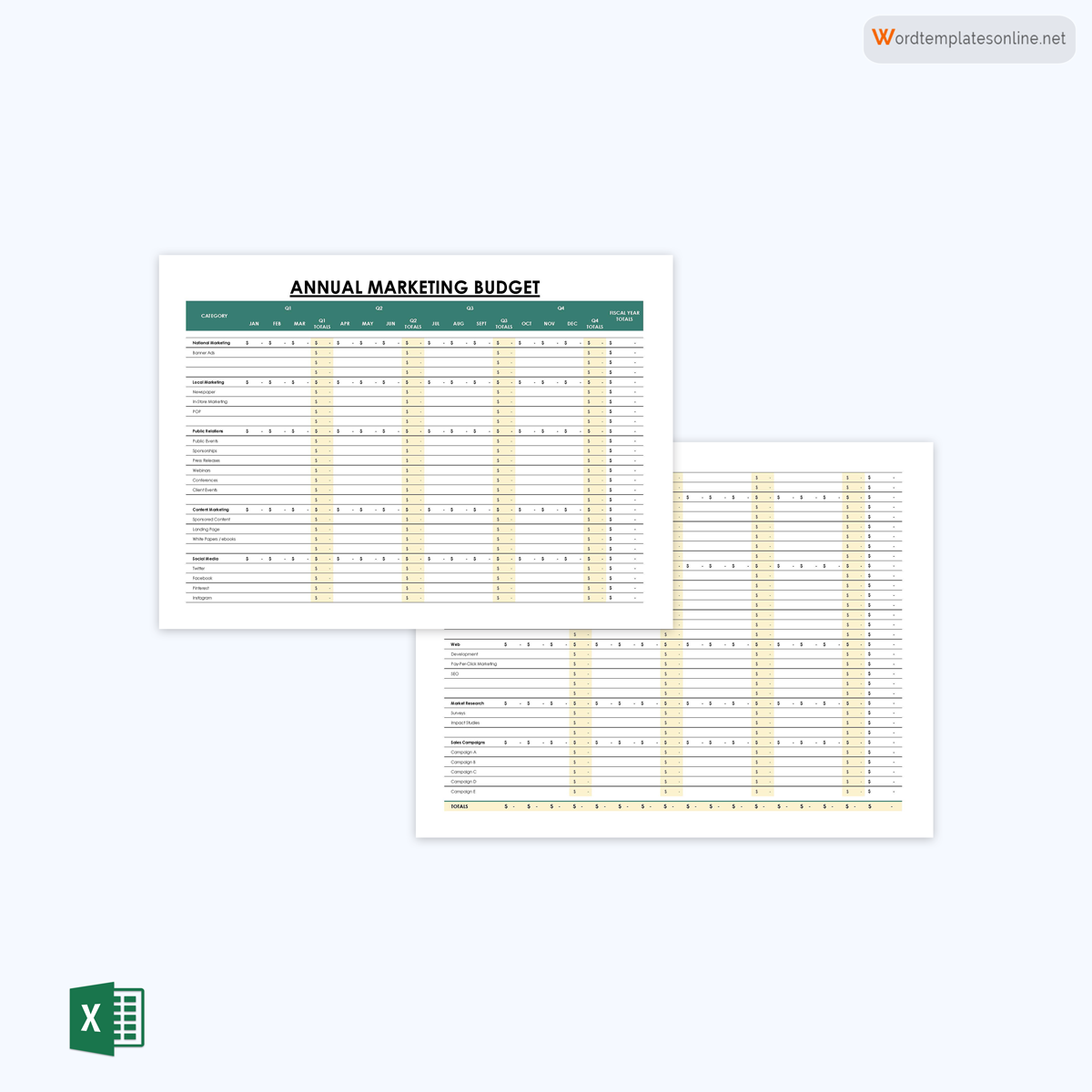
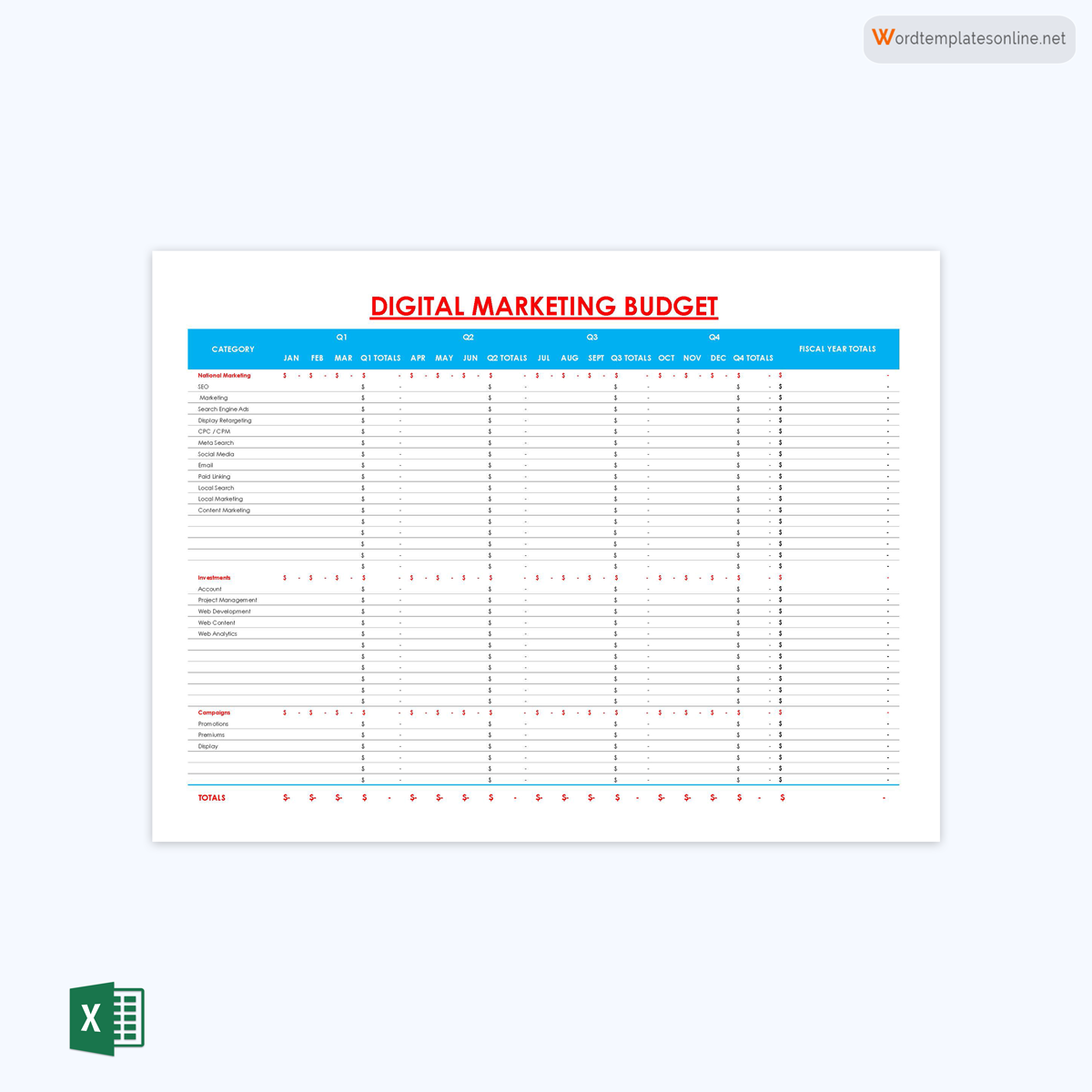
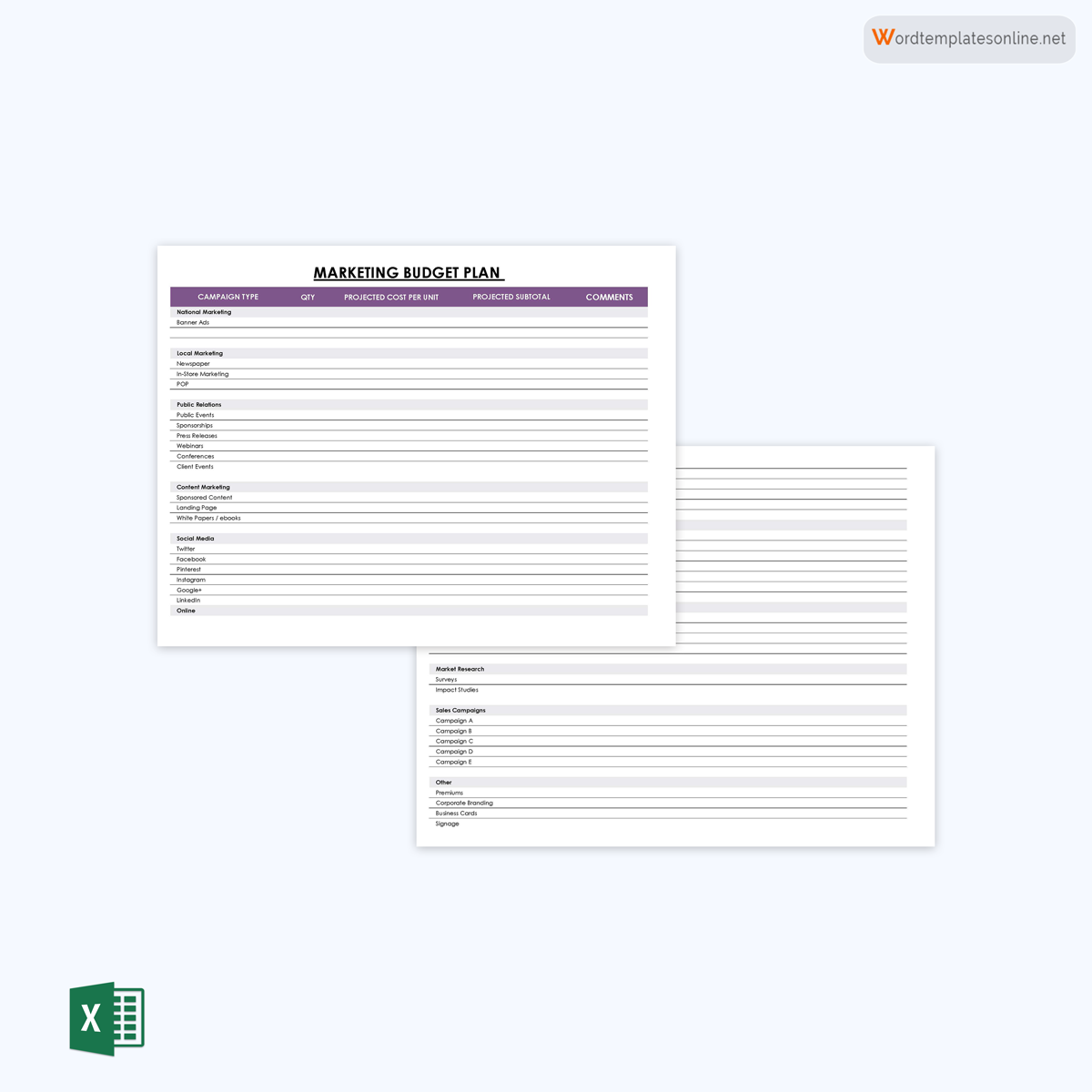
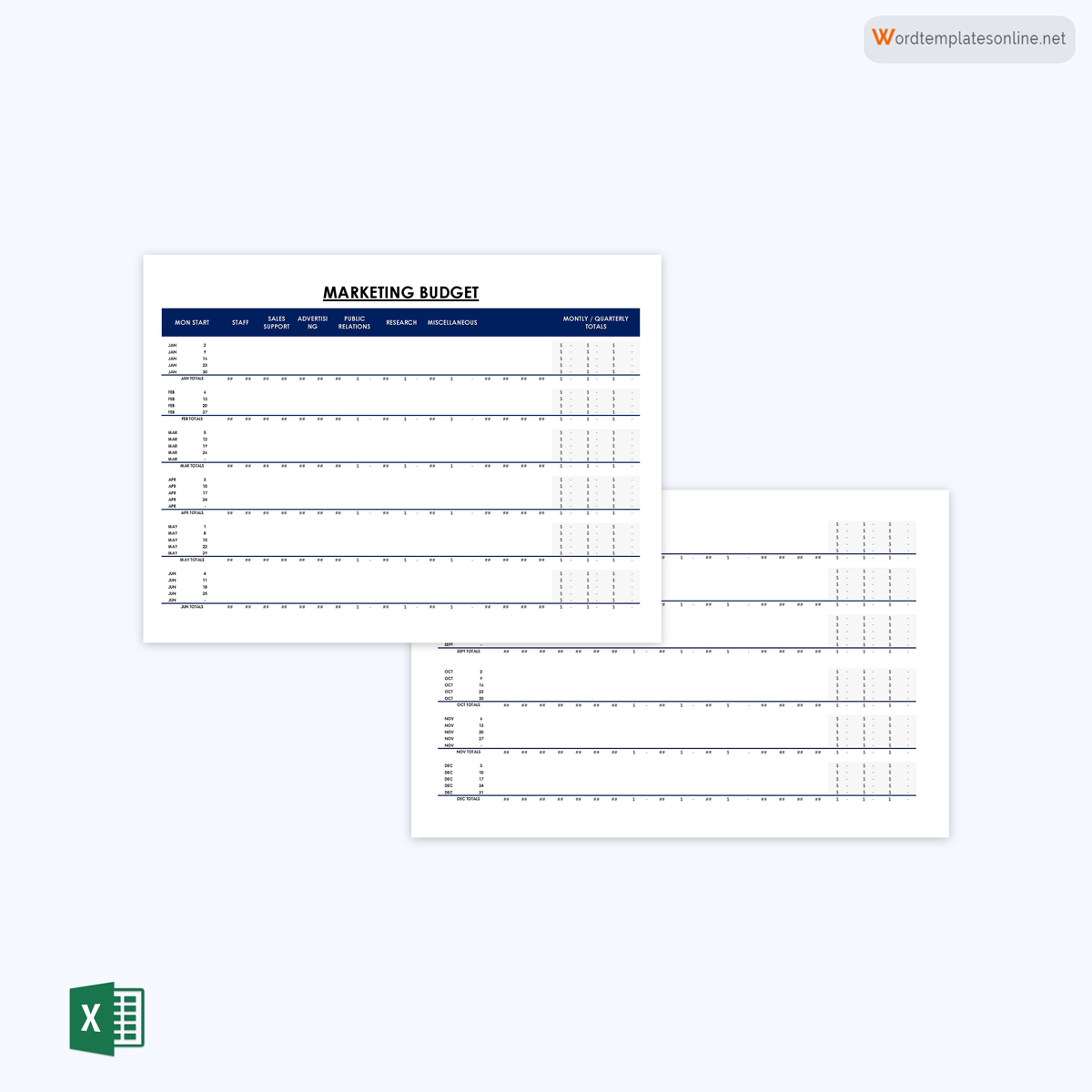
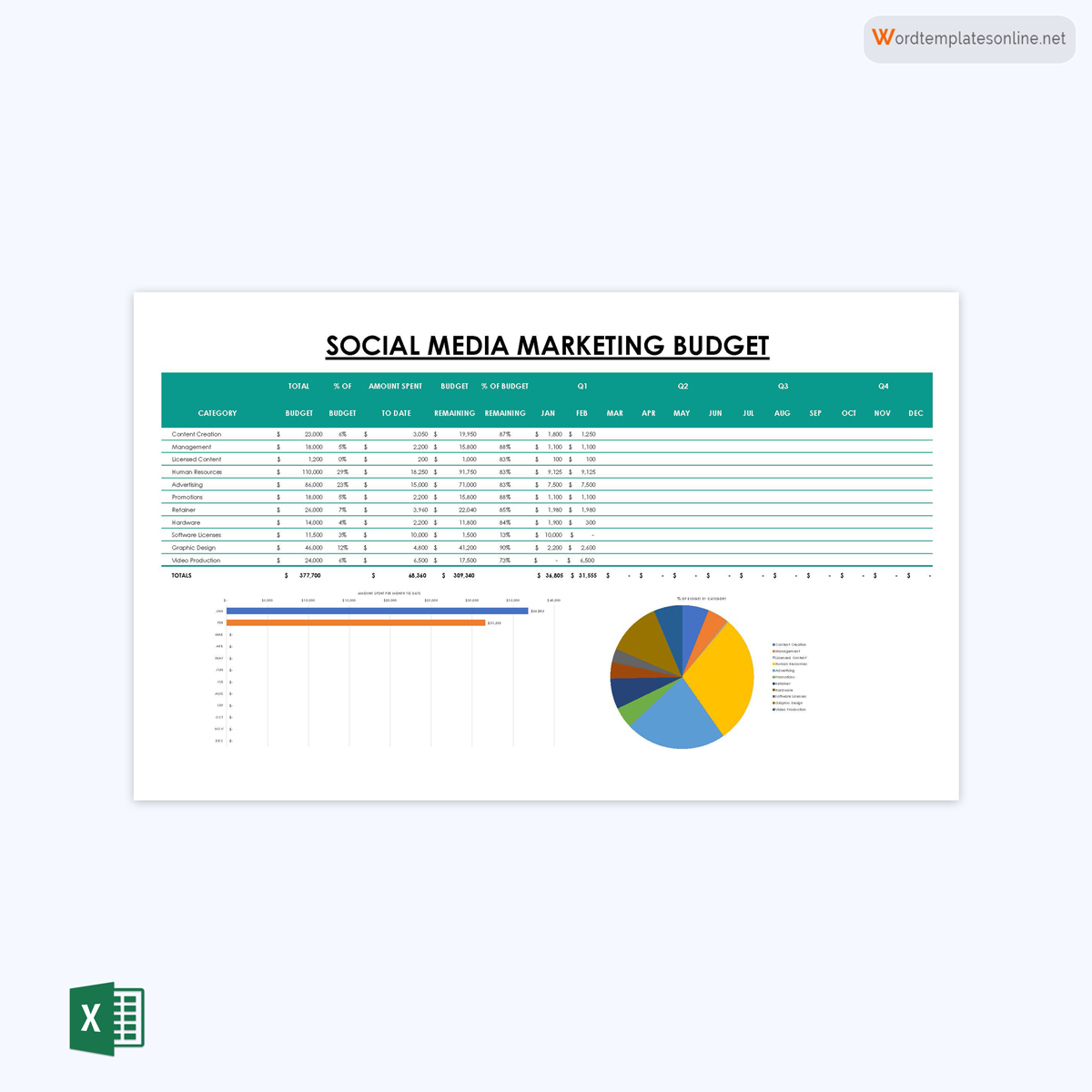
When and Who Should Use a Marketing Budget?
In a corporate organization, the budget is the marketing department’s responsibility. More specifically, it falls under the purview of whoever creates the organization’s annual goals, strategies, and initiatives.
Once the budget has been finalized, the CEO must approve it before implementation. If there is a need for any adjustment or modification, the marketing head will be required to make the necessary changes and submit it again. After approval, the budget plan will be assigned to the team. The marketing director will be in charge and will ensure that the budget is adhered to.
The budget should be completed before the start of a new business year. This way, every initiative and plan for the new year can be well represented in it. Any strategy is only a concept until you begin to allocate dollar amounts to each activity. As a result, a real plan only materializes once all items have a monetary value. You can periodically review and revise the budget once planning has begun.
Every business aims to keep costs low and maximise profits. The budget is a tool to achieve profit maximisation for your business. It ensures the organization does not overspend to effectively promote its products and services across the implementable marketing channels.
What are Marketing Costs?
All of the funds that a business spends on promotional and advertising activities are considered marketing costs. Usually, promotional activities are aimed at building brand awareness and generating more sales. So, any amount spent on activities like online and offline advertising, content creation, software, personnel, etc., constitutes a company’s marketing costs.
How to Plan Your Marketing Budget?
A plan for making a budget for promotional activities is a layout of all the details of strategies and tactics to achieve the organization’s marketing goals and the costs incurred in achieving these goals. It also covers the channels you will need to execute your plans. These channels include social media, Google Ads, public relations, print advertising, demonstrations, promotions, and free product samples.
Planning a budget is more than just having professional knowledge of spreadsheet programs. It is more about identifying the goals, channels, and costs of executing the chosen strategies.
Here is a detailed guide on how to plan your marketing budget:
Know your buyer’s journey
The first way to plan a budget is to understand the buyer’s journey. The buyer’s journey is the thought process of an average person which starts as a prospect until they eventually buy your product. Knowing how your customers think will enable you to better understand their motivations, primary interests, interactions with your products, and the marketing channels that have the greatest impact on them. Once you understand this part, you will know which channel is most effective and how to use it.
To better understand your buyers, there are certain things to research. For instance, you need to understand what makes your customers buy your products. You also need to find out how many leads you get through your marketing channels and how many of them actually become customers. Then, you should also find out how much it costs to get those leads.
The final step is determining how much revenue is generated each time a lead purchases your product. As a result of this process, you can determine which tactics are effective, which goals need to be altered, and where you should focus when allocating funds.
Use the 5% rule
In the business world, a rule of thumb encourages business owners to adopt the 5% method for their marketing. The 5% rule suggests businesses should use between 2% and 5% of their total sales revenue for promoting their products or services. However, this is only a suggestion, and companies can choose an appropriate percentage depending on their goals and their position in the market.
For example, a new company trying to compete with its existing competitors may need to spend up to or more than 20% of its revenue on marketing. What is important is ensuring that the returns on such investments are worth it.
Creating a Marketing Budget Template
Creating a template for a marketing budget is not a straightforward process. There are a lot of channels, data, and information to consider, and the total cost of your campaign will depend on all these expenses.
In other words, there are lots of details to focus on, which can be challenging. But with a template, businesses can simplify the process of creating their plan. The templates can be easily modified so that marketing managers can immediately start using them.
The template should include the following information:
Company information
Since the template of marketing budget is personal, it should contain company information like the name, logo, marketing project, and client details. You should also ensure that the template is dated accordingly.
Total marketing budget
One of the primary purposes of a budget template is to analyze the cost of a project. So, you should include this detail in your template. However, you should categorize your plan into different categories and sub-categories, mention their individual costs, and clearly state the total.
Marketing categories
As stated earlier, a marketing plan has different categories and sub-categories. Include all of these categories and their sub-units. For example, a major category like digital marketing can have sub-categories like Google ads, YouTube bumper ads, Facebook ads, etc.
Year-to-date spending
The YTD spending is applicable if you have spent money on previous marketing campaigns. In that case, you should include the total amount you have spent on marketing projects in a year by adding different quarterly expenditures. This will give you a detailed breakdown of your expenses and the funds you have remaining in your budget template.
Funds remaining
In this column of template, you will have the remaining amount after your YTD spending has been subtracted from your total marketing budget. So you will be able to clearly see if you are within your budget or have exceeded it.
Quarterly spending
There are four quarters in a year, so a template has four columns where you can add your quarterly spending. The total YTD spending is calculated automatically from these numbers.
Marketing Budget Breakdown
Usually, companies spend between 7% and 10% of their annual revenue on marketing. So, if you are unsure or just getting started with marketing for a small business, you can adopt the generic 70-20-10 rule.
This means after you have subtracted your marketing budget from your revenue, you should allocate 70% of the amount to channels and strategies you know will be successful. 20% should go to new ideas and strategies, and 10% should be for testing new channels.
For example, if your budget is $1,000, $700 should be allocated to social media marketing and digital campaigns, $200 toward a new feature you are testing on your app or website, and $100 to feature in external digital content.
Here are some of the common marketing channels:
Software
You cannot manage digital and print advertisements without software. You will also need software to design banners, flyers, etc. Customer Relationship Management (CRM) software is also crucial. However, these programs are completely free, though some do offer free trials.
Freelancers
Sometimes, you may need to hire independent contractors for a temporary campaign. In a case like this, you need to include the freelancers’ wages and other benefits in your budget.
New personnel
Depending on the skill set needed for your marketing strategy, you might also need to hire new employees. Include their salary, laptop costs, and other benefits in your budget.
Content marketing
Content marketing is a very effective model. It can triple your lead generation when compared to traditional methods. But you also need to invest time and money into creating videos, blog posts, etc. and posting them on different platforms. These associated costs have to be included in your budget as well.
Paid search advertising
Paid advertising campaigns (PPC), as their name suggests, are not cost-free. You have to include the costs of your PPC campaigns, Google ads, SEO, etc., in your budget plan. You can also use Google’s Keyword Planner to get an estimate.
Social media platforms like Facebook, Twitter, Instagram, and YouTube have paid marketing options you can use for your campaigns. You must ascertain the cost of paid advertisements on your preferred options because their prices vary.
You may also outsource this to a digital agency to manage it for you. In that case, you will have to consider their service charge and other costs as well.
Email marketing
Email marketing is non-negotiable for any business, especially if your business thrives on online communications. It helps you connect with your audience and inform them about your products and services. Find out the costs associated with the email marketing platform or software you want to use. If you outsource this campaign, then the costs for the services of the contractor will have to be included in your budget.
Search engine optimization
SEO marketing makes your marketing efforts more fruitful. If done correctly, your website will rank higher on search engines like Google and reach more leads. However, this requires skill and experience. So, you may need to hire an SEO expert or outsource to a digital agency, and this cost will also be added to your budget.
Tips for Making an Effective Marketing Budget
The following tips will help you make an effective budget:
Review marketing budgets by industry
The amount of money spent on promotional activities varies for different industries and sectors of the economy. So, when making your budget plans, you will need to consider what your competitors spend on their campaigns and then plan using that estimate for yours.
Look at key budget statistics
An integral part of budgeting is getting relevant statistical data to aid your planning. Statistical data will help you understand pain points, executable strategies, and marketing channels. It will also help you obtain pre-existing benchmarks.
Align your budget with your goals
When planning your budget, you will need to tailor it to meet your marketing goals for the year. Instead of evenly distributing funds across all channels, the budget must be designed with a focus on achieving the current objectives and allocating resources where they are more likely to achieve desired results.
Beware of unexpected costs
One advantage of having a budget is that it keeps you from exceeding your financial capacity. In addition, it encourages you to critically review every expense before approving it.
However, you may encounter unexpected costs while executing your marketing plan. If an unexpected expense occurs, you can plan for it in the next budget by documenting and acknowledging it.
Measure ROI
When a company wants to grow and gain a larger market share, it begins to increase the percentage of total revenue spent on marketing on a daily basis. So, to know where to direct that increased percentage, it is important to measure ROIs. ROIs give you a clear direction about the effectiveness of the increased spending.
If your company makes more profit from spending money on one marketing channel, it may be worthwhile to increase that specific budget in the next year. If it is otherwise, you might need to consider reducing the money spent on that channel.
Frequently Asked Questions
A company’s marketing spending is the sum of all its marketing costs. This cost is usually determined by what percentage of the company’s revenue will be allocated to promotional activities, and then the relevant team or manager can devise a strategy based on that figure.
Budgets depend on the size of the company, so there is no fixed amount. An amount that is too much for some business enterprises can be too little for others depending on the size of the company and the industry, among other things.
Marketing campaigns can vary substantially in size and format. Thus, their cost can range from less than $100 for a one-person business to tens of thousands for a much larger one.
The cost of email marketing depends on the number of subscribers you have. You can, however, use free software if you have a small list.
The cost of an in-house marketing team is determined by the team’s size, expertise, and other expenses. However, you can outsource marketing campaigns to a digital agency to save costs.
Consultants charge varying fees. You can find consultants with fees ranging from $100 to $1,500 per day.
Influencers also charge varying fees. Some work with agencies, while others are independent contractors. Similarly, their number of followers and the task you need them to do will influence your charges. But on average, influencers charge between $500 and $10,000, if not more.
The scope, business size, and overall marketing goals determine a marketing strategy’s cost. On average, its cost ranges from $1,000 to $10,000 or more.












